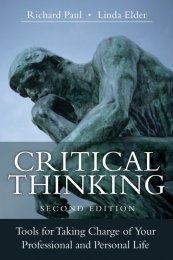Critical Thinking: Tools for Taking Charge of Your Professional & Personal Life - Second Edition
Authors: Richard Paul and Linda Elder
Publisher: Prentice Hall
Copyright: 2014
ISBN-10: 0-13-311528-3
ISBN-13: 978-0-13-311528-4
Pages: 458
Weight: 1.75 lbs.
Binding: Hard Cover
Contact Info for Rowman & Littlefield:
- Toll free: (800) 462-6420 ext. 3024
- Fax: (800) 338-4550
- Orders to orders@rowman.com
- Queries to customercare@rowman.com
You are what you think…
Everything you do in life is determined by the quality of your thinking. If you aren't thinking clearly, you're at the mercy of everyone else-from dishonest politicians to aggressive, stop-at-nothing ad agencies. Unfortunately, many people never give any thought to how they think. No wonder they're susceptible to the frustration, pain, ineffectiveness, and financial loss that result directly from poorly considered thinking. Critical Thinking is about becoming a better thinker in every aspect of your life-as a professional, as a consumer, citizen, friend, parent, and even as a lover.
$48.00
Additional Information About:
Critical Thinking: Tools for Taking Charge of Your Professional & Personal Life - Second Edition
Drs. Richard W. Paul and Linda Elder, leaders of the Center for Critical Thinking, identify the core skills of effective thinking, then help you analyze your own thought processes so you can identify your weaknesses and overcome them. As you learn how to think more effectively, you’ll empower yourself as never before, discovering new opportunities, avoiding disastrous mistakes, and gaining new clarity throughout your entire life.
The six stages of thinking: which stage are you in?
Discovering where you stand in the hierarchy of effective thinking.
The poor thinking habits everyone falls into-and how to get out of them;
Getting past the egocentrism and sociocentrism that shackle our progress.
Setting higher standards for our thinking;
Imbuing our thinking with clarity, relevance, logic, accuracy, depth, significance, precision, breadth, and fairness.
Thinking more effectively in the workplace;
Overcoming the unique obstacles to effective thinking in businesses and organizations.
Strategic thinking: taking responsibility for your own growth;
Directing your thinking towards your most important goals and purposes.
Critically assessing the views of experts;
Assessing matters of fact, matters of opinion, and matters of judgment.
Practical techniques for making more intelligent decisions;
Applying critical thinking to life’s key decisions.
The ethical implications of effective thinking;
Why thinking and character are inextricably linked-and how to become a more ethical thinker.
CONTENTS
Ch. 1: Thinking in a World of Accelerating Change and Intensifying Danger
Ch. 2: Becoming a Critic of Your Thinking
Ch. 3: Becoming a Fair-Minded Thinker
Ch. 4: Self-Understanding
Ch. 5: The First Four Stages of Development: What Level Thinker are You?
Ch. 6: The Parts of Thinking
Ch. 7: The Standards for Thinking
Ch. 8: Design Your Life
Ch. 9: The Art of Making Intelligent Decisions
Ch. 10: Taking Charge of Your Irrational Tendencies
Ch. 11: Monitoring Your Sociocentric Tendencies
Ch. 12: Developing as an Ethical Reasoner
Ch. 13: Analyzing and Evaluating Thinking in Corporate and Organizational Life
Ch. 14: The Power and Limits of Professional Knowledge (And of the Disciplines that Underlie Them)
Ch. 15: Strategic Thinking Part One
Ch. 16: Strategic Thinking Part Two
Glossary: A Guide to Critical Thinking Terms and Concepts References
REVIEWS
Caught in the maelstrom of life? Looking for a way to make sense of the chaos enmeshing you? Critical Thinking: Tools for Taking Charge of Your Professional and Personal Life provides a method for unraveling the complexities of life and reweaving them into an integrated tapestry which gives meaning and purpose to the life of the individual and his/her relation to others.
This book is a natural correlative of a previous book by Paul: Critical Thinking: What Every Person Needs to Survive in a Rapidly Changing World. However, the current book is not about ‘survival’ but about ‘taking charge’. It deals with the fundamentals of critical thinking and their necessity and applicability in making the decisions which give direction to one’s life. It’s a book of questions, not answers, questions about one’s thinking which as Paul and Elder state in a graphic, pg 45, “your thinking controls your emotions and your decisions”. This book not only presents a mirror in which to see oneself through questions, but also presents the challenge to look honestly into the mirror with the view to improve the image.
Critical Thinking: Tools for Taking Charge of Your Professional and Personal Life is written in a readily understandable and easily readable style. This is a book for Everyman. It is a book not only to be read, but lived.
Rev. Robert J. Schlim, S.J.
Paul and Elder’s “Critical Thinking: Tools for Taking Charge of Your Personal and Professional Life” provides the key to developing ones mind as an active tool for quality thinking and ultimately better decision-making in professional and personal life. This book explicates the difference between quality thinking in professional practice and flawed thinking. The authors challenge a personal self-examination of the quality of the reader’s thinking with activities that are insightful, cognitively interesting and structured so each component of thinking is enhanced. The approach is practical, and meaningful for the reader interested in developing as a critical thinker. Paul and Elder’s expertise in dealing with the complexity of thinking needed to survive in society today is illuminating.
As a nurse leader working in a chaotic health care system subject to constant change and revision: critical thinking is the answer to implementing an improvement in health care delivery. The authors have unlocked the mystery of improving my thinking for quality decision-making in my nursing practice. The more I work with these ideas for improving the quality of my critical thinking and decision-making in nursing practice the more empowered I am as a person and professional nurse.
Penny Heaslip, RN
Chairperson, School of Nursing
University College of the Cariboo
